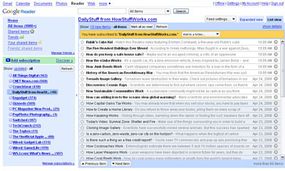Rss Feed How Does It Work
Reading RSS feeds can be a great time-saver. In the time it takes you to scan whole Web pages for information, you can review headlines from dozens of sites all collected in one place. On the other hand, the ease with which you can view RSS headlines may convince you that you can subscribe to even more sites. You may end up spending just as much time reading feeds as you used to on regular Web sites.
Reading feeds requires a few simple things, many of which you already have. You'll need a computer -- or compatible electronic device -- and an Internet connection. After that, you need something that can read, or aggregate, RSS files. Aggregators collect and interpret RSS feeds in one location. That way, you can see the latest headlines from HowStuffWorks, CNN, the BBC and Reuters, all in one place.
Do you want to see full articles on one page? Or do you just want the headlines? Do you want everything organized by date, with the feeds mixed by most recent, or would you prefer to keep each site separate? These are options that your aggregator will give you help you enjoy your reading.
Aggregators take many forms. When you use a current-generation Web browser to visit blogs or news sites, you'll probably see the square orange logo that indicates the presence of an RSS feed. Depending on what kind of site you're visiting, you may even see a link with a whole list of feeds. Once you click on a link to the feed, you'll get the option to subscribe. Different browsers handle feeds differently, but you'll probably be given a choice of options for handling the subscription.
Would you prefer to let your Web browser handle your RSS feeds? Some browsers let you read the feeds within the program itself. Firefox, Internet Explorer and Safari are among the browsers that incorporate this feature. This gives you a couple of advantages: You don't have to switch programs when you want to catch up on your feed reading, and you don't have to switch back to your aggregator if you run across a great site which you'd like to follow.
There are disadvantages to using your browser, too, probably the most serious of which is that if you use more than one computer to access the Internet, you have no good way to synchronize your RSS feeds. If you take 15 minutes at lunch to catch up on the latest headlines at your desk, later on you'll be seeing some of the same headlines on your home computer.
The popularity of RSS feeds has encouraged companies that offer personal home pages, such as Yahoo! and Google, to incorporate feed readers into their products. If you have a MyYahoo! or iGoogle page, you can add your feeds there. Whether you read at home or at work, you'll be receiving the same information.
Most personal start pages offer only a limited number of viewable items per feed, though you may have the option to see more. More than likely, these personalized pages will also group your feeds together by site. If you would prefer your feeds mixed together, for example with the newest items from all feeds on top, you will want to consider sites that serve as feed aggregators, such as Bloglines, Google Reader or Rojo. These sites will also give you the option to group feeds together. If you want your national news in one folder and your gardening blogs in a separate folder, you can do that.

HowStuffWorks.com screenshot
Of course, if it's features you want, you can use a software feed reader that will give you even more options. You can save some items for later, read articles offline, synchronize between different computers, the list goes on. There are drawbacks: It's not as convenient as reading feeds right in your browser, and there may be a cost involved. But if you like the special features and you read a lot of RSS feeds, it may be worth looking into.
Do you have a Web site? It's easy to put a feed on the Web. On the next page, we'll take a look at what you'll need if you want to start publishing your own RSS feed.
Source: https://computer.howstuffworks.com/internet/basics/rss.htm
0 Response to "Rss Feed How Does It Work"
Postar um comentário